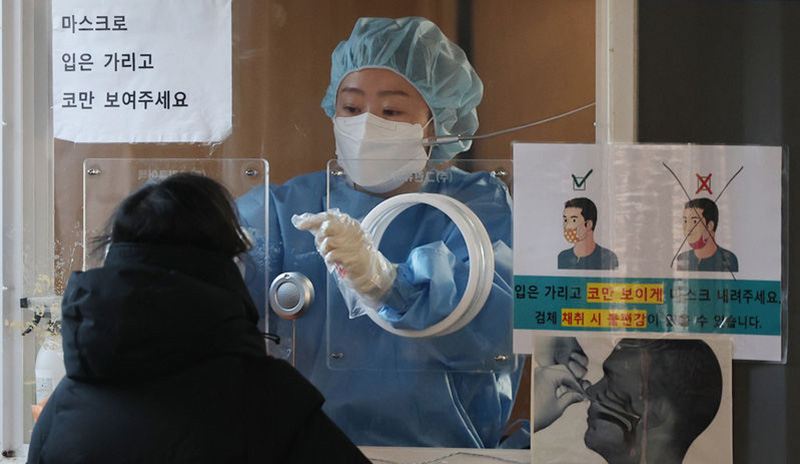
Health official takes a nasopharyngeal swab from a test seeker at a clinic set up outside Seoul Station on Jan. 14.
18:12 JST, January 23, 2022
When the inevitable omicron explosion descends on South Korea, the kind of restrictive approach to dealing with the virus will have run its course, top officials say.
In a news briefing on Jan. 14, the Health and Economy ministries said Korea will focus on keeping its businesses and other aspects of daily life as open as possible once the new variant starts dominating the scene.
The characteristics of omicron called for “a shift in a paradigm toward a more flexible response,” said Health Minister Kwon Deok-cheol.
“When omicron becomes dominant, cases are almost certain to rise significantly, in which case Korea will start pursuing a targeted protection of people at higher risk rather than control of the entire community, as it has been so far,” he said.
The threshold for transition to the omicron-specific strategy is 7,000 cases occurring per day, the minister said. For the past week, Korea has been counting an average of around 3,700 daily cases.
When that point comes, the country will ease up on many pillars of its pandemic control.
PCR testing, previously open to anyone wishing to get tested, will be offered primarily to older adults ages 65 and up, close contacts of confirmed patients and people who have tested positive in rapid antigen tests. People with COVID-19-like symptoms will need a doctor’s recommendation to get tested.
For the rest, rapid antigen tests or the at-home kits will be the default testing method.
Contact tracing, conducted for close contacts of patients, will operate on an honor system basis. People who are younger than 60 and without existing health conditions can report their itineraries on a smartphone application.
Clinics will be set up to permit home recovery patients access to in-person care without having them take up bed spaces.
The isolation period for patients will be cut from the current 10 days to seven. Close contacts of patients will be tested on sixth day of quarantine to be released on seventh day depending on test results.
Travel bans on 11 countries — Botswana, Eswatini, Ghana, Lesotho, Malawi, Mozambique, Namibia, Nigeria, South Africa, Zambia and Zimbabwe — will end. The mandatory quarantine of 10 days for all arrivals may be adjusted, although the negative PCR testing requirement is likely to remain in place.
This contrasts with lockdown or similarly restrictive steps that other countries like Australia and the Netherlands have taken to counter omicron.
In a release to reporters on the same day the Health Ministry said, “When omicron drives cases up exponentially, the existing ways of responding to the virus may no longer be viable.”
Namely the 3T — rigorous testing, contact tracing and extensive treating — will hit a limit, forcing compromises, the ministry said.
The goal of the new strategy befitting omicron is “to provide a focused protection of vulnerable populations and respond to the pandemic in a sustainable manner,” the ministry said, explaining that the present rules were designed for combatting the more severe delta variant.
The ministry says the country’s hospitals are well-prepared to withstand a forthcoming surge.
Over the last two and a half months since Nov. 1, when the “living with COVID-19” scheme kicked off, more than 8,000 beds have been added through a series of executive orders on hospitals, it said. A wider home recovery program was also expected to reduce the strains.
As the country relaxes its grip on restrictions, its stock of vaccine and treatment will be beefed up, Kwon said.
Oral antivirals as well as omicron-targeting vaccines — if they should come along — will be brought in without delay, he said. Decisions are soon to be made on clearing vaccines for kids ages 5 to 11.
Top Articles in World
-

Israeli Ambassador to Japan Speaks about Japan’s Role in the Reconstruction of Gaza
-

Videos Plagiarized, Reposted with False Subtitles Claiming ‘Ryukyu Belongs to China’; Anti-China False Information Also Posted in Japan
-

North Korea Possibly Launches Ballistic Missile
-

Chinese Embassy in Japan Reiterates Call for Chinese People to Refrain from Traveling to Japan; Call Comes in Wake of ¥400 Mil. Robbery
-

Russia: Visa Required for Visiting Graves in Northern Territories, Lifting of Sanctions Also Necessary
JN ACCESS RANKING
-

Japan PM Takaichi’s Cabinet Resigns en Masse
-

Japan Institute to Use Domestic Commercial Optical Lattice Clock to Set Japan Standard Time
-

Israeli Ambassador to Japan Speaks about Japan’s Role in the Reconstruction of Gaza
-

Man Infected with Measles Reportedly Dined at Restaurant in Tokyo Station
-

Videos Plagiarized, Reposted with False Subtitles Claiming ‘Ryukyu Belongs to China’; Anti-China False Information Also Posted in Japan





















